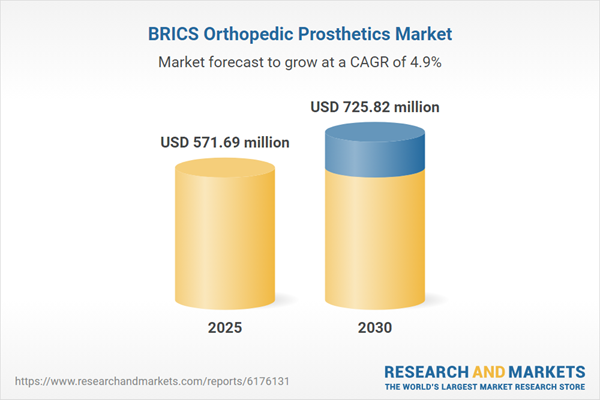BRICS Orthopedic Prosthetics Market Size:
The BRICS Orthopedic Prosthetics Market is expected to grow from USD 571.689 million in 2025 to USD 725.822 million in 2030, at a CAGR of 4.89%.The BRICS orthopedic prosthetics market represents a significant growth opportunity driven by unique demographic, economic, and healthcare infrastructure dynamics across Brazil, Russia, India, China, and South Africa. This market serves individuals who have lost limbs due to accidents, congenital conditions, or those requiring support for structural deformities and chronic pain management in areas such as the back, knees, and joints.
Market Drivers and Growth Catalysts
The market's expansion trajectory is fundamentally supported by increased governmental healthcare investments across BRICS nations. These emerging economies are positioning themselves as future global leaders in manufacturing, services, and raw materials, leveraging competitive advantages including low production costs, abundant labor availability, and strategic infrastructure investments in social sectors.The demographic transition toward an aging population across BRICS countries creates substantial market demand. Age-related bone deterioration, characterized by reduced nourishment and increased fragility, leads to higher incidence of fractures, deformities, and structural failures requiring prosthetic intervention. This demographic shift establishes a sustainable long-term demand foundation for orthopedic prosthetics.
Rising disposable income levels across BRICS economies facilitate greater healthcare investment capacity among consumers, directly correlating with expanded market penetration potential. The collaborative framework among BRICS nations in healthcare facility development provides additional stability and growth momentum for the sector.
Market Challenges and Constraints
Despite positive growth indicators, the market faces significant barriers that require strategic consideration. Affordability remains a critical constraint, particularly affecting low- and middle-income demographics who represent substantial market segments across BRICS nations. The high cost of prosthetic devices, combined with ongoing maintenance requirements, creates accessibility challenges that may limit market penetration rates.Infrastructure limitations, including insufficient specialized facilities and support services, further constrain market development potential. These systemic challenges require coordinated efforts between government initiatives, private sector investment, and international cooperation to address effectively.
Regional Market Dynamics: India as a Case Study
India presents a compelling market paradox within the BRICS framework. While maintaining the lowest healthcare sector expenditure among BRICS nations, India demonstrates one of the highest amputation rates globally at 0.62 per 1,000 population. This statistic underscores significant unmet market demand.Road accidents represent the primary causative factor for amputations in India, with the country recording the highest global road accident fatality rate. The disability prevalence rate of 2.21% falls within the global standard range of 2-4%, indicating alignment with international demographic patterns while representing substantial absolute numbers given India's population scale.
The Indian market exemplifies the broader BRICS challenge: high demand coupled with affordability constraints and infrastructure limitations. This dynamic creates both opportunity and complexity for industry stakeholders.
Strategic Implications
The BRICS orthopedic prosthetics market offers substantial growth potential driven by demographic trends, economic development, and increasing healthcare awareness. However, success requires strategic approaches addressing affordability challenges through innovative financing mechanisms, technology optimization for cost reduction, and collaborative public-private partnerships.Market participants should focus on developing cost-effective solutions tailored to BRICS economic conditions while maintaining quality standards. Government collaboration and support will be crucial for market expansion, particularly in addressing infrastructure gaps and implementing supportive regulatory frameworks.
The market's exponential growth potential during the forecasted period positions it as an attractive investment opportunity for industry stakeholders willing to navigate the unique challenges and leverage the distinctive advantages present in BRICS economies.
Key Benefits of this Report:
- Insightful Analysis: Gain detailed market insights covering major as well as emerging geographical regions, focusing on customer segments, government policies and socio-economic factors, consumer preferences, industry verticals, and other sub-segments.
- Competitive Landscape: Understand the strategic maneuvers employed by key players globally to understand possible market penetration with the correct strategy.
- Market Drivers & Future Trends: Explore the dynamic factors and pivotal market trends and how they will shape future market developments.
- Actionable Recommendations: Utilize the insights to exercise strategic decisions to uncover new business streams and revenues in a dynamic environment.
- Caters to a Wide Audience: Beneficial and cost-effective for startups, research institutions, consultants, SMEs, and large enterprises.
What do businesses use these reports for?
Industry and Market Insights, Opportunity Assessment, Product Demand Forecasting, Market Entry Strategy, Geographical Expansion, Capital Investment Decisions, Regulatory Framework & Implications, New Product Development, Competitive IntelligenceReport Coverage:
- Historical data from 2022 to 2024 & forecast data from 2025 to 2030
- Growth Opportunities, Challenges, Supply Chain Outlook, Regulatory Framework, and Trend Analysis
- Competitive Positioning, Strategies, and Market Share Analysis
- Revenue Growth and Forecast Assessment of segments and regions including countries
- Company Profiling (Strategies, Products, Financial Information, and Key Developments among others.
BRICS Orthopedic Prosthetics Market Segments:
By Type
- Feet
- Knee
- Limb System
- Ankles and Adapters
- Cosmesis
- Liners
- Others
By Technology
- Conventional
- Electric-Powered
- Hybrid
- Customized Technologies
By End-User
- Hospitals
- Prosthetic Clinics
- Rehabilitation Centres
- Home Care
By Region
- Brazil
- Russia
- India
- China
- South Africa
Table of Contents
Companies Mentioned
- Blatchford Limited (via Endolite India)
- Otto Bock HealthCare GmbH
- Meditech Technologies Ltd.
- Fillauer LLC
- WillowWood Global LLC
- Hanger, Inc.
- Zimmer Biomet
- Stryker
Table Information
| Report Attribute | Details |
|---|---|
| No. of Pages | 149 |
| Published | August 2025 |
| Forecast Period | 2025 - 2030 |
| Estimated Market Value ( USD | $ 571.69 million |
| Forecasted Market Value ( USD | $ 725.82 million |
| Compound Annual Growth Rate | 4.8% |
| Regions Covered | Brazil, China, India, Russia, South Africa |
| No. of Companies Mentioned | 8 |









